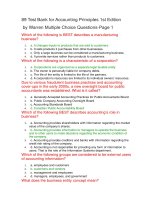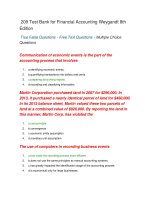Lecture Accounting principles (8th edition) – Chapter 23: Budgetary planning
Bạn đang xem bản rút gọn của tài liệu. Xem và tải ngay bản đầy đủ của tài liệu tại đây (1.76 MB, 61 trang )
Chapter
23-1
CHAPTER 23
BUDGETARY
PLANNING
Accounting Principles, Eighth Edition
Chapter
23-2
Study Objectives
Study Objectives
1.
Indicate the benefits of budgeting.
2.
State the essentials of effective budgeting.
3.
Identify the budgets that comprise the master budget.
4.
Describe the sources for preparing the budgeted income
statement.
5.
Explain the principal sections of a cash budget.
6.
Indicate the applicability of budgeting in nonmanufacturing
companies.
Chapter
23-3
Preview of Chapter
Preview of Chapter
Budgeting is critical to financial wellbeing
Use budgets in planning and controlling operations
Specific focus is on how budgeting is used as a planning tool by
management.
Chapter
23-4
Budgetary Planning
Budgetary Planning
Budgeting
Budgeting
Basics
Basics
Preparing
Preparingthe
the
Operating
Operating
Budgets
Budgets
Budgeting & accounting
Benefits
Sales
Production
Essentials of effective
budgeting
Length of budget period
Direct materials
Direct labor
Budgeting process
Budgeting and human
behavior
Budgeting and longrange planning
The master budget
Chapter
23-5
Manufacturing
overhead
Selling and
administrative
expense
Budgeted income
statement
Preparing
Preparingthe
the
Financial
Financial
Budgets
Budgets
Cash
Budgeted
balance sheet
Budgeting
Budgetingin
in
NonNonmanufacturing
manufacturing
Companies
Companies
Merchandisers
Service
Not-for-profit
Budgeting Basics
Budgeting Basics
Budget
A formal written statement of management’s plans for a specified
future time period, expressed in financial terms
Primary way to communicate agreedupon objectives to all parts of
the company
Promotes efficiency
Control device
evaluation
Control device important basis for performance
once adopted
Chapter
23-6
Budgeting Basics – Role of Accounting
Budgeting Basics – Role of Accounting
Historical accounting data on revenues, costs, and expenses help in
formulating future budgets
Accountants normally responsible for presenting management’s
management’s
budgeting goals in financial terms
The budget and its administration are, however, entirely
management’s responsibility
Chapter
23-7
Budgeting Basics Benefits
Budgeting Basics Benefits
Requires all levels of management to plan ahead and formalize
goals on a recurring basis
Provides definite objectives for evaluating performance at each
level of responsibility
Creates an early warning system for potential problems
Chapter
23-8
LO 1: Indicate the benefits of budgeting.
Budgeting Basics Benefits
Budgeting Basics Benefits
Facilitates coordination of activities within the business
Results in greater management awareness of the entity’s overall
operations and the impact of external factors
Motivates personnel throughout organization to meet planned
objectives
Chapter
23-9
LO 1: Indicate the benefits of budgeting.
Budgeting Basics Benefits
Budgeting Basics Benefits
A budget is
an aid to management
not a substitute for management.
Chapter
23-10
LO 1: Indicate the benefits of budgeting.
Let’s Review
Let’s Review
Which of the following is not a benefit of budgeting?
a.
Management can plan ahead.
Management can plan ahead
b. An early warning system is provided for potential problems.
c. It enables disciplinary action to be taken at every level of
responsibility.
d. The coordination of activities is facilitated.
Chapter
23-11
LO 1: Indicate the benefits of budgeting.
Effective Budgeting
Effective Budgeting
Depends on a sound organizational structure with authority
and responsibility for all phases of operations clearly defined
Based on research and analysis
with realistic goals
Accepted by all levels of
management
Chapter
23-12
LO 2: State the essentials of effective budgeting.
The Budget Period
The Budget Period
May be prepared for any period of time
Most common one year
Supplement with monthly and quarterly budgets
Different budgets may cover different time periods
Long enough to provide an attainable goal and minimize seasonal or
cyclical fluctuations
Short enough for reliable estimates
Continuous twelvemonth budget
Drop the month just ended and add a future month
Keeps management planning a full year ahead
Chapter
23-13
LO 2: State the essentials of effective budgeting.
The Budgeting Process
The Budgeting Process
Base budget goals on past performance
Collect data from organizational units
Begin several months before end of current year
Develop budget within the framework of a sales
forecast
Shows potential industry sales
Shows company’s expected share
Chapter
23-14
LO 2: State the essentials of effective budgeting.
The Budgeting Process
The Budgeting Process
Factors considered in Sales Forecasting:
Chapter
23-15
General economic conditions
Industry trends
Market research studies
Anticipated advertising and promotion
Previous market share
Price changes
Technological developments
LO 2: State the essentials of effective budgeting.
Budgeting and Human Behavior
Budgeting and Human Behavior
Participative Budgeting
May inspire higher levels of performance or discourage additional
effort
Depends on how budget developed and administered
Invite each level of management to participate
This “bottomtotop” approach is called
Participative Budgeting
Chapter
23-16
LO 2: State the essentials of effective budgeting.
Participative Budgeting
Participative Budgeting
Advantages:
More accurate budget estimates because lower level managers
have more detailed knowledge of their area
Tendency to perceive process as fair due to involvement of
lower level management
Overall goal produce a budget considered fair
and achievable
by managers while still meeting
corporate goals
Risk of unreliable budgets greater when they are
Chapter
23-17
“topdown”
LO 2: State the essentials of effective budgeting.
Participative Budgeting
Participative Budgeting
Disadvantages:
Can be time consuming
and costly
Can foster budgetary
“gaming” through
budgetary slack:
situation where managers intentionally
underestimate budgeted revenues or
overestimate
budgeted expenses so that
budget goals are easier to meet
Chapter
23-18
LO 2: State the essentials of effective budgeting.
Participative Budgeting
Participative Budgeting
Flow of budget data from lower management to top levels
Chapter
23-19
LO 2: State the essentials of effective budgeting.
Budgeting Versus Long Range Planning
Budgeting Versus Long Range Planning
Three basic differences between Budgeting and Long
Range Planning:
Time period involved
Emphasis
Detail presented
Time period:
Budgeting is shortterm – usually one year
Long range planning at least five years
Chapter
23-20
LO 2: State the essentials of effective budgeting.
Let’s Review
Let’s Review
The essentials of effective budgeting do not include:
a.
Topdown budgeting.
Topdown budgeting
b. Management acceptance.
c. Research and analysis.
d. Sound organizational structure.
Chapter
23-21
LO 2: State the essentials of effective budgeting.
The Master Budget
The Master Budget
A set of interrelated budgets that constitutes a plan of action for a
specified time period
Contains two classes of budgets:
Operating budgets:
Individual budgets that result in the preparation of the budgeted
income statement – establish goals for sales and production
personnel
Financial budgets:
The capital expenditures budget, the cash budget, and the
budgeted balance sheet – focus primarily on cash needs to fund
operations and capital expenditures
Chapter
23-22
LO 3: Identify the budgets that comprise the master budget.
The Master Budget Components
The Master Budget Components
Chapter
23-23
LO 3: Identify the budgets that comprise the master budget.
Operating Budgets: Sales Budget
Operating Budgets: Sales Budget
First budget prepared
Derived from the sales forecast
Management’s best estimate of sales revenue for the budget
period
Every other budget depends on the sales budget
Prepared by multiplying
expected unit sales volume for each product
times
anticipated unit selling price
Chapter
23-24
LO 3: Identify the budgets that comprise the master budget.
Operating Budgets: Sales Budget
Operating Budgets: Sales Budget
Example – Hayes Company
Expected sales volume: 3,000 units in the first quarter with 500
unit increments for each following quarter
Sales price: $60 per unit
Chapter
23-25
LO 3: Identify the budgets that comprise the master budget.









